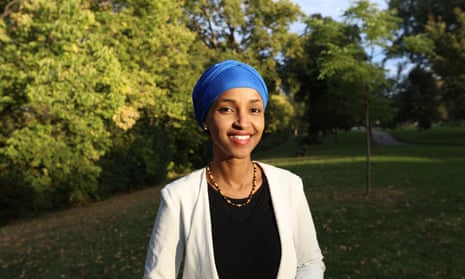It has been a summer of political firsts in the US as a historically diverse field of candidates run for office, largely invigorated by dissatisfaction with Donald Trump’s presidency.
Across the country Democratic women are running for office – and winning primaries – in record numbers. Meanwhile, barrier-breaking candidates have become a feature of the primary election season for not just women, but LGBT, religious minority, and candidates of color as well. Here are some of the faces looking to make political representation more representative this November:
Ilhan Omar, Minnesota, candidate for US Congress
Omar, a former Somali refugee, was nominated by Democrats in Minnesota on Tuesday to battle for the state’s Democratic-leaning fifth district. She spent the last four years as a state legislator championing progressive causes like a $15 minimum wage and subsidising higher education costs for low-income students.
Her congressional platform has been similarly bold: arguing for the cancellation of student debt, banning private prisons and aggressive funding cuts to military spending for what she calls “perpetual war and military aggression”.
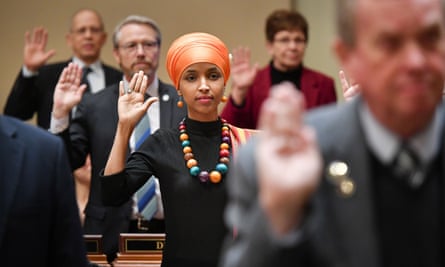
Part of a wave of Democrats unabashedly appealing to the party’s left flank, Omar has not been shy in her critique of Democratic politics-as-usual either. “We’ve become the party that wants to appease everyone and no one. And I think the only way that the Democrats become viable again is if we have people who have moral clarity and courage to say what they need to say and fight for what they need to fight for,” she told supporters at a campaign event before her primary win.
Omar is extremely likely to win her race in November and replace the Minnesota congressman Keith Ellison, the first Muslim elected to Congress, who is retiring to run for attorney general in the state. She would be the first Somali-American member of Congress and the first Muslim woman member of Congress, though she will almost certainly have company on that milestone.
Rashida Tlaib, Michigan, candidate for US Congress
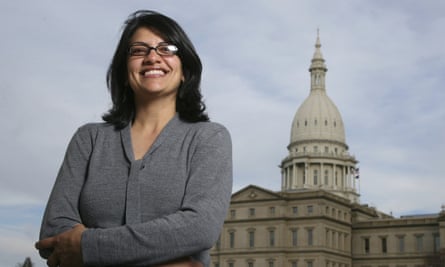
Tlaib is running unopposed in her race to represent Michigan’s 17th district, and is all but assured to become the nation’s first Palestinian-American female representative to Congress, and to be among the first Muslim women – if not the first – to serve in the chamber.
A Democratic-Socialist, Tlaib served on the state legislature from 2009 to 2014. She ran her congressional primary race on a campaign supporting Medicare for all, a $15 minimum wage and abolishing the Immigration and Customs Enforcement agency (Ice).
Tlaib’s “resistance” bona fides are unimpeachable, having been escorted from a Trump rally in 2016 as she shouted questions at the then presidential candidate on whether he had ever read the US constitution. Tlaib describes the moment as the “most American thing that I could ever have done”.
Tlaib told Democracy Now that her first act as a congresswoman would be to introduce a modernized version of the 1964 Civil Rights Act to mend what she sees as a slow national abandonment of its precepts at the hands of conservative judges, who only recognize a violation where there is clear “discriminatory intent”.
“I want to … change it back to saying that if you show that the impact [is] discriminatory when it’s implemented, when it’s on the ground, then it should be considered a violation of our civil rights.”
Christine Hallquist, Vermont, candidate for state governor
On Tuesday in Vermont, the Democrat Christine Hallquist became the first transgender candidate to win a major-party nomination for governor. She will face off with a popular Republican incumbent in the heavily Democratic-leaning state in November.
Hallquist is a first-time political office seeker who had previously worked in business, technology, and been heavily involved in cooperative economic ventures (co-ops). She is running on a progressive platform that includes a $15 minimum wage, paid family and medical leave, and universal healthcare.
In a recent appearance on CNN she rejected the label of socialist, however, saying: “I look at the platform of a living wage and healthcare for all, that is called civilized society. I don’t know even how that became socialism or Republican or Democrat. Let’s be a civilized society.”
As for her history-making nomination, Hallquist acknowledged that it is “significant” and “pioneering”, but downplayed the importance in favor of the issues. “I think Vermonters are going to vote for me because of what I’m going to do for Vermont,” Hallquist told Business Insider.
Deb Haaland, New Mexico, candidate for US Congress

Running in New Mexico’s heavily Democratic first district, Haaland is likely to become the first Native American woman elected to the House in November. Like many of the other candidates on this list, she is running to the party’s left flank on a Medicare-for-all, free university tuition, and anti-war platform. She has openly advocated for the abolition of Ice and wants to demilitarize US police.
A strident critic of the president, Haaland told the Guardian last month that she believes “Trump has given many people the courage to be bold in their racism. He gives the white supremacists and the far-right folks cause to be.”
An attorney and community organizer with a working-class pedigree, Haaland is a citizen of the Pueblo of Laguna tribe and proudly describes herself as a 35th-generation resident of New Mexico – dating back long before the state’s incorporation. Her progressive politics include an aggressive defense of the interests of Native people, especially under the Trump administration who she believes has made those communities increasingly vulnerable. Haaland pointed to the administration’s plan to enforce Medicaid work requirements for Native Americans, a move that tribal leaders say would restrict access to healthcare and undermine their sovereignty.
“Donald Trump and the billionaire class should consider this a warning shot,” Haaland tweeted in a statement after her 5 June primary victory. “The blue wave is coming.”
Sharice Davids, Kansas, candidate for US Congress
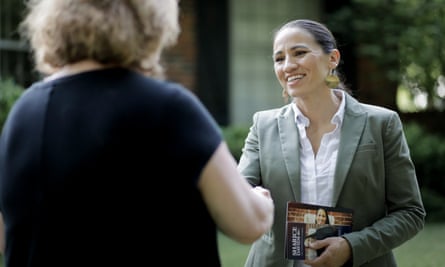
Haaland may be joined as the first Native American woman in Congress by Davids, who has already made history as Kansas’s first openly gay, Native American nominee for Congress. Davids faces a tough race against the incumbent Republican Kevin Yoder in a district that Hillary Clinton won narrowly. If elected, she would be the first openly LGBT person to represent Kansas at either the federal or state level.
Running as a Democrat in the very conservative state, Davids’ platform is not as radical as many of the other candidates on the list, but focuses on similar themes such as reducing the cost of college tuition and securing full citizenship for Dreamers.
Davids stopped short of calling for the abolition of Ice in an interview with the Kansas City Star, but said that “the call to abolish Ice stems from a very real problem and very real pain being inflicted by this agency”. Similarly, she said Medicare for all “is a goal and a good slogan”, but said her immediate focus would be on expanding access to the national healthcare programs Medicare and Medicaid.
A member of Ho-Chunk Nation, a Native American tribe in Wisconsin, Davids would also be the nation’s first congresswoman with mixed martial arts experience if elected.
Jahana Hayes, Connecticut, candidate for US Congress
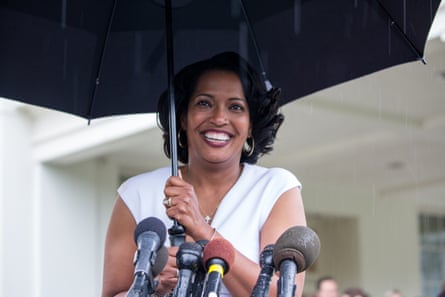
Hayes, a Democrat, will become the first African American woman from the state to serve in Congress if she wins her Democrat-leaning district in November after an unlikely primary win on Tuesday.
Her victory followed a whirlwind but truncated campaign just three months long. After the incumbent resigned, Hayes threw her hat in the ring at the urging of the Connecticut senator Chris Murphy and won handily, defeating a candidate with more party support.
“People told me I had no chance and I had no business trying to do this,” she said after her victory. “We proved them wrong.”
Winner of the National Teacher of the Year award in 2016, Hayes put education at the fore of her campaign. “Education is very important to me. I recognize that, you know, for most of the people in our communities, it’s a game changer,” She told NPR in an interview.
Her platform also includes single-payer healthcare, passing “commonsense” gun legislation and restoring citizenship protections for Dreamers.
The six women join a bumper crop of primary winners who are changing the face of US office seekers moving towards November’s midterms. They include:
Stacey Abrams, who in May became the first African American woman ever to win a major-party nomination for governor in Georgia. Abrams previously served as the youngest deputy city attorney in Atlanta and has been a state legislator since 2006. She faces a tough but competitive race to turn the typically red state blue.
Alexandria Ocasio-Cortez, the 28-year-old daughter of a Puerto Rican mother and Bronx-born father, would be youngest woman ever elected to Congress if she wins in November. In a stunning upset, Ocasio-Cortez toppled the fourth-ranking Democrat in a liberal New York district that will almost certainly send her to Congress.
Abby Finkenauer and Cindy Axne, who are both running for congressional seats in Iowa, and could make history as the first women ever elected to Congress from the state. Both won their Democratic primaries and face Republican incumbents in November.
Lupe Valdez became the first Latina and the first openly LGBT person to win a major-party nomination for governor in Texas, though the current Dallas county sheriff faces extremely long odds in November against the incumbent Greg Abbott.
Texas could also send its first Latina to Congress. The former county judge Veronica Escobar and the state senator Sylvia Garcia are both poised to win in November and would become the first Latinas to represent a state in which the electorate is nearly 40% Hispanic.
The Texas Democratic congressional nominee Gina Ortiz Jones will make history on two fronts if she wins a hotly contested House seat in November: as the first openly lesbian Iraq war veteran and first Filipina-American to represent the state in the US House.
